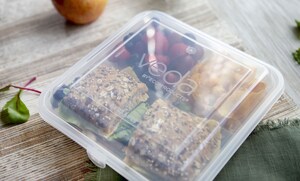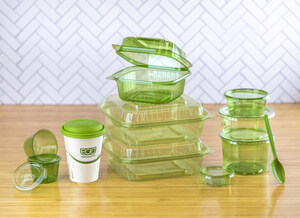Minnesota Twins, Eco-Products Partner to Turn Fans' Trash into Treasure
MINNEAPOLIS, March 29, 2017 /PRNewswire/ -- After turning 300 tons of trash into fertile soil last year, the Minnesota Twins and Eco-Products plan to top that number this year.
With the help of fans, hundreds of thousands of beer cups, plates and nacho trays at Target Field were converted to compost last year. This year, the Minnesota Twins want to create even more compost – starting on Opening Day, Monday, April 3.
"Our fans should be proud of all they're doing to make Target Field the greenest ballpark in America," said Jase Miller, Manager of Ballpark Operations for the Minnesota Twins. "Together, we've kept hundreds of tons of trash out of local landfills. That's a huge win not just for Target Field, but for the whole community."
Eco-Products, based in Boulder, Co., supplies the compostable cups, plates, trays, utensils and straws at Target Field. Much of the packaging relies on a material called Ingeo™, a compostable resin made by a company called NatureWorks headquartered a short distance from Target Field in Minnetonka, Minn.
"The Minnesota Twins have become a national leader in reducing the amount of materials going to landfills," said Sarah Martinez, Director of Marketing of Eco-Products. "This is one more reason why fans should feel great about games at Target Field. The Twins are doing things the right way."
At Target Field, all plastic bottles and aluminum can be recycled, while all other concessions-related products can be composted. That includes beer cups, soft drink cups, coffee cups, plates, trays, soup cups, spoons, knives, forks, lids and straws.
The stadium has bins for the compostable materials set up around the stadium, side-by-side with recycling bins. Because almost everything is recyclable or compostable, a two-bin solution does the trick and there is no need for landfill bins.
The effort actually simplifies things for fans. All plates, utensils and trays can go into the same compostable bin – along with any leftover food.
"You don't need to toss your plate in one bin and your leftover food in another," Martinez said. "This makes it a lot easier to be green."
Last year, Target Field composted 300.89 tons of plates, wrappers, cups, trays and food, and recycled 464 tons of glass bottles and aluminum cans. Organizers are working to beat those numbers this year.
Target Field is adding new equipment, improving the sorting bins and providing more training for concession-stand workers.
"Everyone wants to keep trash from going to landfills," Miller said. "We're working to make it as simple as possible."
After each game, workers empty the compost bins and the material is taken to a commercial composting facility. There the stadium's trash is turned into organic materials such as soil for area farms, gardens and landscapers.
Diverting food and other items from the landfill has numerous benefits: Not only does it extend the life of landfills, but treating soil with compost also supports plant growth and minimizes the need for irrigation and artificial fertilizers.
"The benefits of this initiative go far beyond Target Field," Martinez said.
The compostable products at the ballpark have been specially branded for Target Field and show the products don't have to go to a landfill. So every beer cup and nacho tray serves as a reminder about saving the planet.
"No one wants to leave a stadium piled high with trash destined for a landfill," Miller said. "We all want to be part of a solution. And that's what we're doing here."
Contact: Mark Pankowski
301-260-9250
SOURCE Eco-Products
WANT YOUR COMPANY'S NEWS FEATURED ON PRNEWSWIRE.COM?
Newsrooms &
Influencers
Digital Media
Outlets
Journalists
Opted In





Share this article